Fortified gateway
A fortified gateway is an element of a variety of fortified structures, such as a castle or walled town. Fortified gates or gateways appear in the Bronze Age and reach into the modern times.
City gate
Gatehouse
Torburg
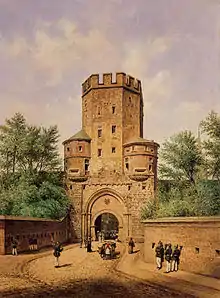
The Severin Gate in Cologne
In German, a "Torburg", lit. "gate castle", is a relatively autonomous and heavily fortified gateway of a castle or town. Medieval castle gateways of this type usually have additional fortifications in front of them. A common form is the tower gateway (German: Turmtorburg); a variant is the bastion gateway (German: Halbrundturmtorburg). They are common in Europe.
France
Germany
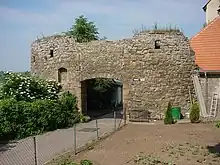
Fortified gateway of Seeburg Palace
.jpg.webp)
Porta Nigra in Trier
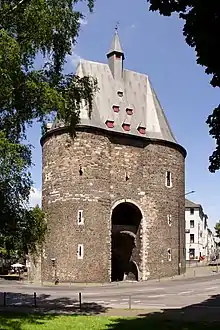
Marching Gate (double gate castle) in Aachen
- Deutsches Tor in Metz
- Ehrentor, Eigelsteintorburg, Hahnentorburg, Kuniberts Tower, Schaafentor and Severin Gate in Cologne
- Town fortifications of Erkelenz
- Friedländer Tor in Neubrandenburg
- Marching Gate and Bridge Gate in Aachen as well as Aachen's city walls
- Upper Gate in Neuss
- Fortified gateway of Seeburg Palace
- Star Gate in Bonn
- Fortified gateway of Stolberg Castle in Stolberg (Rhineland)
- Porta Alba, Porta Nigra and Imperial Baths in Trier
Romania (Transylvania)
- Stundturm in Sighișoara
United Kingdom
- Westgate at Canterbury
- Balkerne Gate at Colchester
- Bargate, Southampton
- Castle Upton in Templepatrick, Northern Ireland
- Kingsgate and Westgate, Winchester
- Monnow Bridge, Monmouth - the only surviving type in Britain with the gatehouse positioned on the bridge
- Portgate on Hadrian's Wall
- Five Arches Gate and Whitesand Gate at Tenby
- Micklegate Bar and other gates at York
On coats of arms
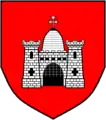 Fortified gate in the Limerick coat of arms
Fortified gate in the Limerick coat of arms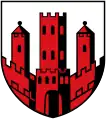 Fortified gate in the Dinslaken coat of arms
Fortified gate in the Dinslaken coat of arms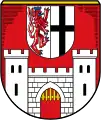 Fortified gate in the Königswinter coat of arms
Fortified gate in the Königswinter coat of arms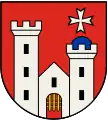 Fortified gate in the Wiehl coat of arms
Fortified gate in the Wiehl coat of arms
See also
This article is issued from Wikipedia. The text is licensed under Creative Commons - Attribution - Sharealike. Additional terms may apply for the media files.